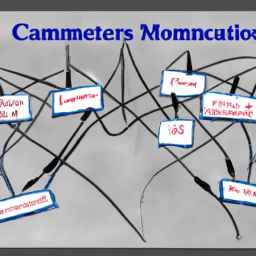Have you ever wondered why some projects succeed while others fail? The secret lies in effective project schedule management and its crucial role in risk mitigation.
By understanding the basics of project schedule management, you can identify potential risks and plan accordingly to mitigate them. Efficient resource allocation is key in ensuring that risks are minimized and project success is maximized.
This article will delve into the importance of implementing mitigation strategies and how they contribute to overall project success. Additionally, we will explore the significance of monitoring and controlling the project schedule to ensure that it stays on track and any deviations are addressed promptly.
By mastering the art of project schedule management, you can maximize project outcomes and achieve success in your endeavors. So, let’s dive in and uncover the secrets behind effective schedule management for risk mitigation.
Key Takeaways
- Effective project schedule management is crucial for project success and risk mitigation.
- Efficient resource allocation minimizes risks and maximizes project success.
- Implementing mitigation strategies contributes to overall project success.
- Regular monitoring helps detect patterns and address areas of concern promptly.
Understanding the Basics of Project Schedule Management
You’ll need to grasp the fundamentals of project schedule management to effectively mitigate risks. Schedule optimization plays a crucial role in ensuring the successful completion of a project within the allocated time frame.
By analyzing the project requirements and available resources, you can create a detailed schedule that maximizes efficiency and minimizes delays. This involves identifying dependencies between tasks, allocating appropriate resources, and setting realistic deadlines.
Additionally, risk assessment is an essential aspect of project schedule management. By thoroughly analyzing the project scope and potential uncertainties, you can identify potential risks that may affect the project schedule. This allows you to proactively plan for contingencies and allocate additional time or resources as needed.
By understanding the basics of project schedule management, you can effectively identify potential risks through effective schedule planning, ensuring the successful execution of your project.
Identifying Potential Risks through Effective Schedule Planning
Starting with a well-crafted schedule can help unearth possible pitfalls, paving the way for a smoother project journey. Risk identification is a crucial aspect of project schedule management as it allows you to proactively identify and address potential risks before they escalate.
By thoroughly analyzing the project schedule, you can identify areas where delays, resource constraints, or dependencies may pose a risk to the project’s success. Schedule optimization enables you to allocate sufficient time and resources to mitigate these risks effectively. It helps you prioritize critical tasks, allocate buffer time for unforeseen events, and identify opportunities for process improvement.
Incorporating risk identification into your schedule planning ensures that you are well-prepared to handle any challenges that may arise during the project.
Transitioning into the subsequent section about efficient resource allocation for risk mitigation, it’s essential to allocate resources wisely to address potential risks effectively.
Efficient Resource Allocation for Risk Mitigation
Efficiently allocating resources is crucial for minimizing potential risks and ensuring the successful mitigation of challenges. Resource optimization plays a key role in project schedule management, as it allows for effective risk assessment and mitigation.
By carefully allocating resources, project managers can identify potential bottlenecks, dependencies, and resource constraints that may pose risks to the project’s timeline and overall success. Moreover, efficient resource allocation enables teams to prioritize critical tasks and allocate sufficient resources to address potential risks proactively. This approach ensures that the necessary resources are available when needed, reducing the chances of delays or disruptions.
By optimizing resource allocation, project managers can effectively manage risks and maintain project schedules, ultimately leading to successful project outcomes.
Transitioning into the subsequent section about implementing mitigation strategies to ensure project success, it’s essential to have a comprehensive plan in place that addresses identified risks.
Implementing Mitigation Strategies to Ensure Project Success
Now that we’ve optimized resource allocation, it’s time to put our plan into action and implement strategies to ensure the success of the project.
Implementing contingency plans is a crucial step in risk mitigation. These plans outline specific actions to be taken in the event that identified risks actually occur. By having contingency plans in place, we’re better prepared to handle unforeseen events and minimize their impact on the project.
In order to effectively implement these plans, it’s important to evaluate the severity of each risk. This involves assessing the likelihood of the risk occurring and the potential consequences if it does. By prioritizing risks based on severity, we can allocate resources and focus our efforts on the most critical areas. This proactive approach helps to mitigate potential issues before they escalate.
Transitioning to the next section, monitoring and controlling the project schedule allows us to track progress and make necessary adjustments to ensure project success.
Monitoring and Controlling the Project Schedule
To effectively track progress and make necessary adjustments, you need to maintain a vigilant eye on the project timeline. This involves closely monitoring the project schedule and comparing it to the planned timeline. By doing so, you can identify any potential delays or deviations from the original plan. This allows you to take immediate action to mitigate risks and keep the project on track.
Through regular monitoring, you can detect patterns or trends that may indicate areas of concern and address them promptly. This level of detail-oriented and analytical approach to project schedule management enables you to stay in control and proactively address any issues that may arise.
By effectively tracking progress and identifying delays, you can ensure that your project stays on schedule and maximizes its outcomes through effective schedule management. This sets the stage for success in the subsequent section.
Maximizing Project Outcomes through Effective Schedule Management
By skillfully synchronizing the project timeline, you can secure substantial success and stellar outcomes through savvy schedule management.
Effective time management is crucial for maximizing project outcomes. It involves optimizing the project timeline to ensure that tasks are completed efficiently and on schedule. This requires careful planning, prioritization, and coordination of resources.
Project timeline optimization allows for better resource allocation, reduces the risk of delays, and improves overall project efficiency.
To create imagery in the audience’s mind, imagine a well-choreographed dance performance. The dancers move in perfect harmony, executing each step flawlessly and in sync with the music. Similarly, an optimized project timeline ensures that tasks are executed in a coordinated manner, with each task seamlessly transitioning into the next. This creates a smooth flow of work and minimizes downtime or idle resources. Additionally, it allows for better utilization of resources, as they’re allocated to specific tasks at the right time, maximizing productivity.
Overall, effective schedule management and project timeline optimization are key factors in achieving successful project outcomes.
Frequently Asked Questions
How can project schedule management help in identifying potential risks?
Project schedule management plays a crucial role in identifying potential risks and supporting risk management. By closely monitoring project timelines and deadlines, you can easily detect any deviations or delays that might indicate underlying risks. This allows you to proactively address these issues before they escalate and impact the project’s success.
Additionally, project schedule management helps in organizing and analyzing project data, enabling you to identify patterns and trends that may indicate potential risks and take appropriate measures to mitigate them.
What are some common challenges faced in efficient resource allocation for risk mitigation?
Like a skilled conductor leading an orchestra, efficient resource allocation for risk mitigation can be a daunting task. Challenges arise when determining the right amount of resources needed to address potential risks. The complexity of projects often leads to limited resources, making it crucial to allocate them strategically.
Additionally, conflicting priorities and shifting project requirements can further hinder resource allocation. To overcome these challenges, a meticulous and analytical approach is necessary to ensure that resources are allocated effectively to mitigate risks.
How can mitigation strategies be implemented to ensure project success?
To ensure project success, you need to implement contingency plans and have a well-thought-out risk response planning process.
This involves identifying potential risks, analyzing their potential impact, and developing specific strategies to minimize or eliminate them.
It is crucial to have a detailed plan in place that outlines how you’ll address each identified risk, including the actions to be taken, responsible parties, and timelines.
By proactively addressing and managing risks, you can increase the likelihood of project success.
What are some key indicators to monitor and control the project schedule effectively?
To effectively monitor and control the project schedule, you need to focus on key performance indicators and risk identification.
Key performance indicators help you measure the progress and success of the project schedule. For example, you can track the percentage of tasks completed on time and the variance between planned and actual durations.
Risk identification involves constantly assessing and addressing potential risks that could impact the project schedule. This allows you to proactively mitigate any issues before they occur.
By diligently monitoring these indicators, you can ensure effective project schedule management.
How can effective schedule management maximize project outcomes?
To maximize project outcomes, effective schedule management is crucial.
Picture this: You’re a conductor leading an orchestra. Each musician represents a task or activity in the project schedule. Just as you ensure each musician plays their part at the right time, schedule management ensures tasks are completed efficiently, minimizing delays and maximizing efficiency.
By staying organized and on track, you can ensure stakeholder satisfaction by delivering the project on time and within budget.
Conclusion
In conclusion, project schedule management plays a crucial role in mitigating risks and ensuring project success.
By understanding the basics, identifying potential risks, allocating resources efficiently, implementing mitigation strategies, and monitoring and controlling the schedule, project outcomes can be maximized.
Just like a skilled conductor orchestrating a symphony, project schedule management harmoniously brings together all the moving parts of a project, ensuring that they work seamlessly towards a common goal.
With attention to detail, analysis, and organization, project schedule management sets the stage for a successful project.



























